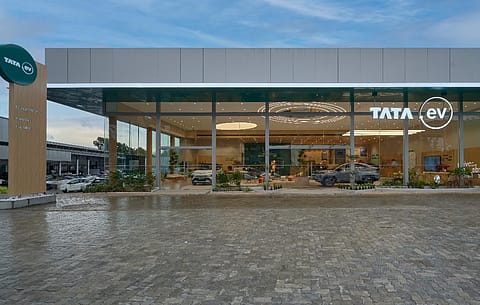Tata Motors is not sold on battery-as-a-service model for EVs
Some GST leakage may be happening under battery-as-a-service model, says Tata Motors group chief financial officer P.B. Balaji.

India’s largest electric carmaker Tata Motors remains unconvinced on the battery-as-a-service (BaaS) model for its electric vehicles.
“We have done the mathematics. We have seen the process. We remain unconvinced particularly in passenger vehicles,” P.B. Balaji, group chief financial officer of Tata Motors, says in a post-earnings media conference call.
JSW MG Motor India, the country’s second-largest EV maker, was the first to introduce the battery-as-a-service option for car buyers.
Balaji, however, says one also needs to think through BaaS from a Goods and Services Tax (GST) point of view. “There may be some leakage that may be happening on that. Therefore, it needs to be seen as an end-to-end process as well, not just as a consumer proposition which is out there,” he says.
The group CFO of Tata Motors says he sees BaaS as an exciting “market activation storyline rather than a real consumer adoption process.”
Recommended Stories
“It is good that people are doing mathematics and understanding economics. This means that the TCO (total cost of ownership) proposition is very well understood. We are delighted by that,” he says.
He, however, says that most of the customers are buying the car and not necessarily using the service offering that is out there. “At this point in time, we remain unconvinced whether BaaS is a viable economic proposition,” says Balaji.
(INR CR)
JSW MG Motor in September launched its latest electric vehicle, the Windsor EV, with battery-as-a-service offering for ₹9.99 lakh. While this brings down the high upfront costs associated with EVs as customers do not own the battery, buyers, however, will have to shell out ₹3.5 per kilometre for its usage. A customer must pay for at least 1,500 kms per month under the battery-as-a-service model, bringing the usage cost of the battery to ₹5,250 per month even if the user drives it for less than 1,500 km. This excludes vehicle charging costs
Explaining the rationale behind BaaS, Parth Jindal, director of JSW MG Motor India, said the majority of car sales in India happen under ₹10 lakh. "We want EV penetration to increase in this country. We don’t think we can do that if we play only in the higher price segment. We need to play in the ₹9-₹11 lakh segment, which is a big segment in the country," said Jindal. "We don’t want to sell just 1,000 cars a month at ex-showroom price," the Jindal family scion said. “With Windsor EV, MG Motor wants to compete with cars costing around ₹10 lakh. That is our ambition. We want this not to be only a Mumbai, Delhi, Kolkata Hyderabad and Chennai phenomenon. We want to go to Tier 2 Tier 3 Tier 4. We want EVs everywhere in this country. The only way of doing it is under the battery-as-a-service model,” said Jindal. JSW MG Motor’s BaaS programme is supported by a network of finance partners - Bajaj Finserv, Hero Fincorp, Vidyut, and Ecofy Autovert.